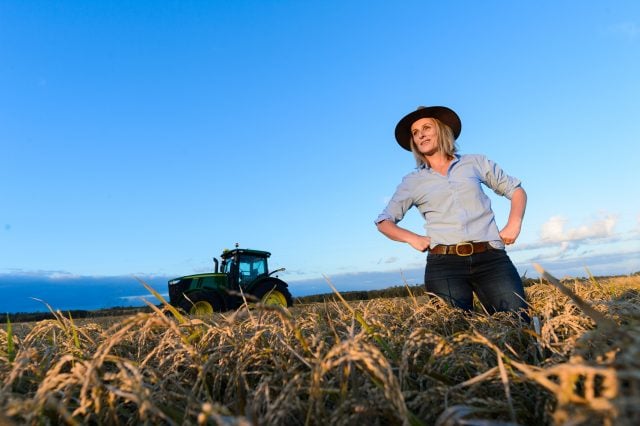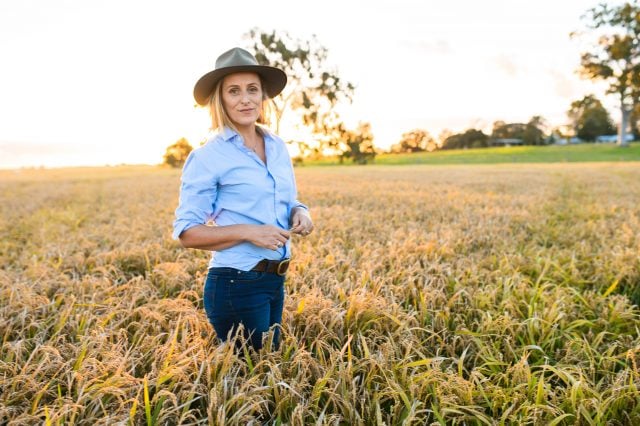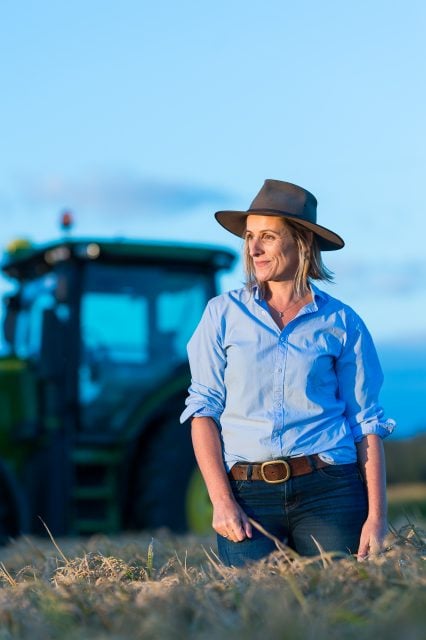
As the climate emergency bites, and the population grows, farmers are becoming more innovative than ever. The passion and imagination of the Northern Rivers agricultural sector makes this a place to watch. The Echo spoke to some of the people who grow our food, and asked what they were doing differently.
What to grow?
Blessed by wonderful soils and rainfall (usually), our region has more agricultural options than many areas, but there’s also a history of destructive farming practices here. Forward-thinking farmers are trying to regenerate the land they steward while simultaneously generating more productivity.
For Sue Higginson of Pelican Creek Farms the answer was rice, but not the artificially irrigated variety mostly grown in Australia. ‘The land we have the privilege of farming is really suitable for dry land rice,’ she said.
‘It’s flood plain country, with rich heavy dark soils. The land floods and holds water. Rice loves water and is happy to sit in it for long periods of time, unlike many other cereal or grain crops. It can also withstand periods between rainfall events. Rice is also a crop that has relatively low inputs and is not susceptible to pests, fungus or infection.’
For Will Brook of Brookfarm, pretty much everything revolves around macadamias, although his operation is a long way from the toxic-laced monoculture usually associated with these delicious nuts.

‘When Pam and Martin (Mum and Dad) bought our farm back in 1988 there were many options on the table – cattle farming, timber harvesting, pecans, even setting up a farmstay,’ Will remembers. ‘After much deliberation, the macadamia was decided upon.’
By this time the nut had gone full circle, from its origins in the Australian rainforest to the USA and Hawaii, before becoming popular again in its home country.
Jodie Viccars and Fabian Fabbro of Woodland Valley Farm say that for them, the chicken literally came before the egg. ‘Multi-species rotational grazing was the primary method we sought to reinvigorate our soils and we chose to do this with hens and cattle. We also believe it is important to consider value adding opportunities and define strategies to minimise waste,’ they said.
‘Bringing back a rich biodiversity, and lovingly repairing our soils, waterways, and sequestering carbon to protect our planet is our primary objective.’
Long term and big picture thinking is also central to the philosophy of market gardener Venetia Scott, who left behind a career in law to grow vegetables in Byron Bay via her business The Good Natured Garden, which operates at The Farm.

Venetia remembers starting as a volunteer. ‘It was the first time I’d ever grown anything. And I was drawn to this particular patch because of the diversity that I saw growing there. It was a real mixture of perennials and annuals. I was really curious to learn about that.
‘Now I grow a very diverse mix of market garden vegetables. At the moment, I’ve got things like carrots and beetroots, radishes, spring onions, cucumbers, zucchinis, watermelons in the ground. Heaps of greens. All the market garden staples. But I’ve also got tree rows in the system, which include perennial plants like bananas and pomegranates.’
Challenges
As a young farmer in the Byron region, Venetia Scott is acutely aware of the pressure on land in the area. ‘There’s definitely great potential for farming here,’ she said, ‘But I also think we need to look at the realities of what it means to farm here with land prices skyrocketing.
‘I will never be able to buy land here and pay it off growing vegetables. That’s not within the realms of possibility. If we’re really serious about creating food security in this region, we need to take a radical look at how we make our land available to people who are really sincere about farming.’
Operating further west, Sue Higginson is also seeing increased pressure on agricultural land. ‘Tea tree is spreading across the region, because the returns are currently high,’ she said.
‘Many of the investors are from overseas. They have paid big dollars for the farmland, which has inflated the market significantly. While this benefits existing landholders, it has a catastrophic impact on new and young farmers trying to enter the sector. The start-up costs of tea tree are high, which means the land is tied up for that use for a long time.
‘These sorts of farming trends are concerning because at the end of the day, you can’t eat tea tree, so from a food security perspective it’s not really the best and highest use of our prime agricultural farmland,’ she said.
Aware of the irony, Will Brook says he’s concerned that many local farms are being bought by those who don’t have a farming background (just like his own family many years ago).
‘This can work as both a positive and negative,’ he said, but he hopes that ‘those new farmers can get the right advice and become strong custodians of their land – to create positive farming ecosystems and encourage others to do the same.’

Jodie and Fabian of Woodland Valley Farm say, ‘Our planet needs topsoil to grow 95% of its food, but due to years of conventional farming methods our topsoil is rapidly disappearing. Without efforts to rebuild soil health, we could lose our ability to grow enough nutritious food to feed the planet’s population.’
Climate disruption is also making things more difficult for people on the land, who need to be at the heart of the solution but are often marginalised. As Sue Higginson puts it, ‘Like most farmers I am really concerned about climate change, particularly that we are heading into more frequent extreme weather events and rising temperatures. Longer and more frequent dry periods will be challenging to dryland rice growers.
‘If we want to see this industry sustained here as part of agricultural identity, we need support to do so, including real action on climate change.’
Sustainability
For Woodland Valley Farm, ‘Regenerative farming goes beyond sustainability. That is, we are not just sustaining the current levels, we are regenerating and building biodiversity back into the soils. We have tested our soils for both carbon and all other elements as a baseline for our business goals.’
In practical terms, everyone and everything living on their farm has a role to play. As Jodie and Fabian explain, ‘The cattle partially graze the land allowing the remaining grass to feed the root system and the pasture to grow back quicker and stronger. We follow the cattle with the hens. The hens spread the cow manure, they eat the bugs and parasites, which have hatched, and play a unique role in ensuring the soil receives the maximum amount of nutrients needed to restore its fertility.

‘The hens arrive a few days following the departure of the cattle to ensure the dung beetles have time to work their magic. Ultimately, we are constantly growing and nurturing our soil workforce. From this beautiful platform we are able to produce sustainable and nutrient dense foods to nourish our community naturally.’
Venetia Scott sees great benefits in keeping things local, and not too big. ‘I like being small, because it’s at a human scale. I can sow my seeds directly by hand, I can have a close and intimate connection with the land I work, and with my customers, and with the other farmers around me. I know almost every plant in that garden.
‘For me this work is really about feeling a deeper connection to the natural world. I get immense pleasure from growing food from the earth.’
Keeping thing local is also important to Venetia. ‘I really believe in supporting and evolving our local food economy. I don’t want my food to travel far. There’s a lot of embedded energy in shipping food across the country.’
As pioneers of regenerative agriculture in the Northern Rivers, Brookfarm are continuing to walk the talk with a solar-powered operations centre, recyclable product bags and their latest two on-farm projects. As Will Brook explains, ‘The first is specifically focusing on regenerative agriculture through inter-row plantings to improve soil health and sequester carbon.’

The second project is about biodiversity. ‘We have placed wildlife boxes through our rainforest to encourage wildlife to the area. We were very excited to find a family of rare sugar gliders have recently taken up residence in one of the boxes.
‘Both of these projects are around our core ethic of doing what is best for the land and attempting to recreate the natural environment that was once present prior to land clearing only a few generations ago.’
For Brookfarm, sustainable agriculture means acting as custodians of the land, rather than taking its resources at any cost. ‘Sustainable agriculture should also have a benefit to the crop and farm itself,’ Will said. ‘Because we have regenerated the rainforest on our farm, this has made it a haven for natural predators (snakes, owls, birds) which now look after the rats on the farm which can decimate a macadamia crop.
‘We also get improved pollination because of the rainforest regen. The inter-row plantings affect our crop positively by improving soil health for the macadamias. Sustainable agriculture should be complimentary to the business of farming, and enhance it rather than detract from the bottom line,’ Will explained.

Sue Higginson agrees. ‘The regenerative agriculture and agro-ecology movements are giving new meaning to sustainable agriculture. Farming is no longer about taking from the environment and adding chemicals and synthetic products to make a profit,’ she said.
‘Farming is fast becoming about regenerating the land and working with nature in order to produce high quality food and fibre products that are healthy for people. It is also about being responsible for the condition of the land that you farm.
‘We are seeing the uptake of more natural fertilisers such as composts, biochar and manures and no-till (direct drill) methods of crop preparation and planting. There is more knowledge about how important soil structure and health is to long term productivity and carbon storage. Importantly, farming is finding a better and more direct relationship with markets and communities,’ she said.
‘The Paddock to Plate, Farm Gate, Farmers Market and Young Farmer Alliance movements have assisted with this very important conversation about where food and produce comes from and how it is made.’
Where is local ag going?
Venetia Scott is coordinator for the local chapter of Young Farmers Connect and is standing for Byron Shire Council. She says there’s a lot of optimism and energy among emerging farmers on the Northern Rivers, despite the challenges, and always much more to learn.
‘There’s a certain mastery that you need to acquire in order to grow food well,’ she said. ‘We’re talking about working with nature, which is an incredibly complex system. To understand how it works is definitely beyond my capacity. I’ll never know what’s truly going on out in that garden. I can only make educated guesses. But I think we are really blessed with our climate and with our soils here,’ said Venetia.

‘There’s so much scope to grow a lot more food in this region, and fibre, and medicines and oils and all sorts of other products. I think that this region has incredible potential, which I’d love to see realised.’
Sue Higginson says diversification is the key to any successful farming enterprise. ‘A number of farmers are trialing hemp in our region, which is very exciting given it can be used as a food, fibre, medicine and cosmetic.’
She also sees a very bright future for dryland rice, with the right support in terms of R&D and the removal of unfair state government imposed market barriers which favour unsustainable southern growers.
In terms of the bigger picture for the region’s farming future, Sue is very optimistic. ‘We have good rainfall, fertile soils and our clean, green brand and image makes us desirable to markets,’ she said.
Because farming here has not focused on being ‘big’, Sue believes the Northern Rivers is more adaptable and resilient. ‘We have focused on quality and innovation. I believe we could be a leader in NSW as a sustainable food and fibre hub as we embrace agricultural industries suited to this region and regenerative agricultural practices.’

As someone who also knows more than a bit about politics, Sue Higginson says politicians need to understand agriculture, and ‘stop seeing it only as a commodity for profit. After all, producing food and fibre is an essential public service.’
Will Brook says that at Brookfarm, flavour is everything, now and into the future. ‘If we create a new product, it has to taste great first. With this in mind we create a whole range of products that we love, and that we want to share with others.’
He credits his parents with creating the backbone of the family business, which is built on the three pillars of quality, sustainability and respect for the land. Rather than following changing trends, Will says Brookfarm is in it for the long haul, and providing a positive example for others, ‘from the regenerative agriculture and rainforest regeneration on our farm, to our sustainability practices in food production.’
For Jodie and Fabian of Woodland Valley Farm, regeneration is the future, along with on-farm value added products (including pasta and duck egg custard in their case).
‘We definitely believe that we are observing a shift to regenerative farming methods and we are seeking every opportunity to raise awareness on environmental issues in a centrist, commercially focused way,’ they said.
‘We have a clear vision on how to operate a successful business, whilst regenerating our land and waterways, adopting sustainable practices and educating our customers, employees and stakeholders about the urgent need to change our global ways to slow, stop and reverse the damage we have done to the planet.
‘Our immediate focus is to consistently drive a culture of “consciousumers” where it becomes second nature to be more conscious of our commercial buying decisions and the impact those collective decisions will have on the health of our planet into the future,’ said Jodie and Fabian.
‘Let’s hope that this becomes a trend not just in farming locally and wider afield but in our population as a whole – think big!’



